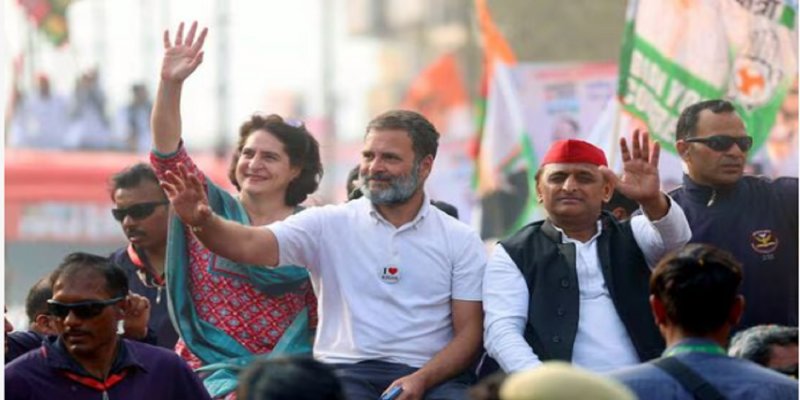`Remove `Modi ka Parivar` from social media handles`: PM Modi`s request to followers
- Saturday | 22nd June, 2024
Congress President Mallikarjun Kharge to attend PM-designate Modi`s swearing-in ceremony
- Thursday | 13th June, 2024

BY Animesh Ikshit
New Delhi, Saturday, 18 May 2024, As India navigates its dynamic political landscape, the necessity for the Indian National Congress (INC) to re-emerge as the leading opposition party has never been more pressing. With the Bharatiya Janata Party (BJP) dominating national politics, a robust and united opposition is crucial for the health of the country’s democratic framework. The growth of regional or section-based parties, such as the Samajwadi Party (SP), Bahujan Samaj Party (BSP), Biju Janata Dal (BJD), Trinamool Congress (TMC), All India Anna Dravida Munnetra Kazhagam (AIADMK), Dravida Munnetra Kazhagam (DMK), Shiv Sena, and others, while reflecting the diversity of Indian polity, also presents challenges to maintaining a cohesive national policy direction.
The rise of these regional entities is rooted in their ability to address local grievances and represent specific communities. However, their increasing power often leads to politics driven by regional appeasement rather than national interests. For instance, the TMC`s focus on West Bengal’s specific issues or the SP and BSP`s prioritisation of Uttar Pradesh`s caste dynamics can overshadow broader national concerns. While these parties are crucial for local governance, their dominance in national politics can fragment policy-making and hinder the implementation of uniform developmental strategies. Recently, the Owaisi brothers of Hyderabad have also started demeaning the importance of the INC.
History offers a poignant lesson on the dangers of a divided opposition. After the Emergency period imposed by Indira Gandhi in the mid-1970s, the opposition managed to overthrow her government in the 1977 elections. However, the ensuing Janata Party coalition, formed by disparate regional and ideological groups, struggled to maintain a unified vision for the nation. This period saw political instability and frequent changes in leadership, which hampered coherent policy-making and governance.
The INC, with its historical legacy and pan-Indian presence, is uniquely positioned to balance regional aspirations with national priorities. Revitalising the INC as the principal opposition would ensure a more stable political environment where national discourse is not fractured by parochial interests. The party`s inclusive ideology can act as a counterbalance to the BJP’s agenda, providing voters with a comprehensive alternative rather than a mosaic of regional promises.
Political analysts highlight the need for the BJP to foster a healthy democratic environment by allowing the INC to thrive as an opposition. Senior political commentator Yogendra Yadav asserts, "A dominant ruling party without a formidable opposition is detrimental to democracy. The BJP should recognise the importance of a strong INC to maintain political equilibrium." This sentiment is echoed by historian Ramachandra Guha, who points out that historically, effective governance in India has been facilitated by the presence of a capable and united opposition.
Moreover, the fragmented opposition comprising regional parties often leads to opportunistic alliances that lack a coherent vision for the nation. The Karnataka elections of 2018, where the INC and Janata Dal (Secular) formed an uneasy coalition, exemplify the instability and policy paralysis that can ensue. Similarly, the power struggles in states like Tamil Nadu post-Jayalalithaa and the volatility in Andhra Pradesh`s political scene post-bifurcation highlight the unpredictability of regional party dominance.
To avert a scenario where national politics is driven by regional appeasement, it is crucial for the INC to rebuild its organisational strength and reconnect with its voter base. The party needs to address its internal challenges, such as leadership crises and factionalism, to present a united front. By doing so, it can effectively challenge the BJP and ensure that national interests take precedence over regional bargaining.
In this context, BJP`s strategy should involve engaging with the INC constructively rather than viewing it purely as a political adversary. Supporting democratic institutions and practices that allow the opposition to function effectively is in the long-term interest of the nation. As political scientist Pratap Bhanu Mehta remarks, "A healthy democracy thrives on the interplay of a strong government and an equally strong opposition. The BJP and INC must both play their parts responsibly."
The resurgence of the INC as the leading opposition party is not just beneficial but necessary for India’s political stability, INC should learn to the re discovering the new avatar much needed for revival with National non appeasement based agendas. It ensures a balanced approach to governance, where regional and national interests are harmonised. For the BJP, enabling the INC to thrive is not a concession but a strategic move to maintain the democratic ethos of the country. The future of India’s political landscape depends on this delicate balance, fostering a democracy that is vibrant, inclusive, and forward-looking.

Your support to NYOOOZ will help us to continue create and publish news for and from smaller cities, which also need equal voice as much as citizens living in bigger cities have through mainstream media organizations.
